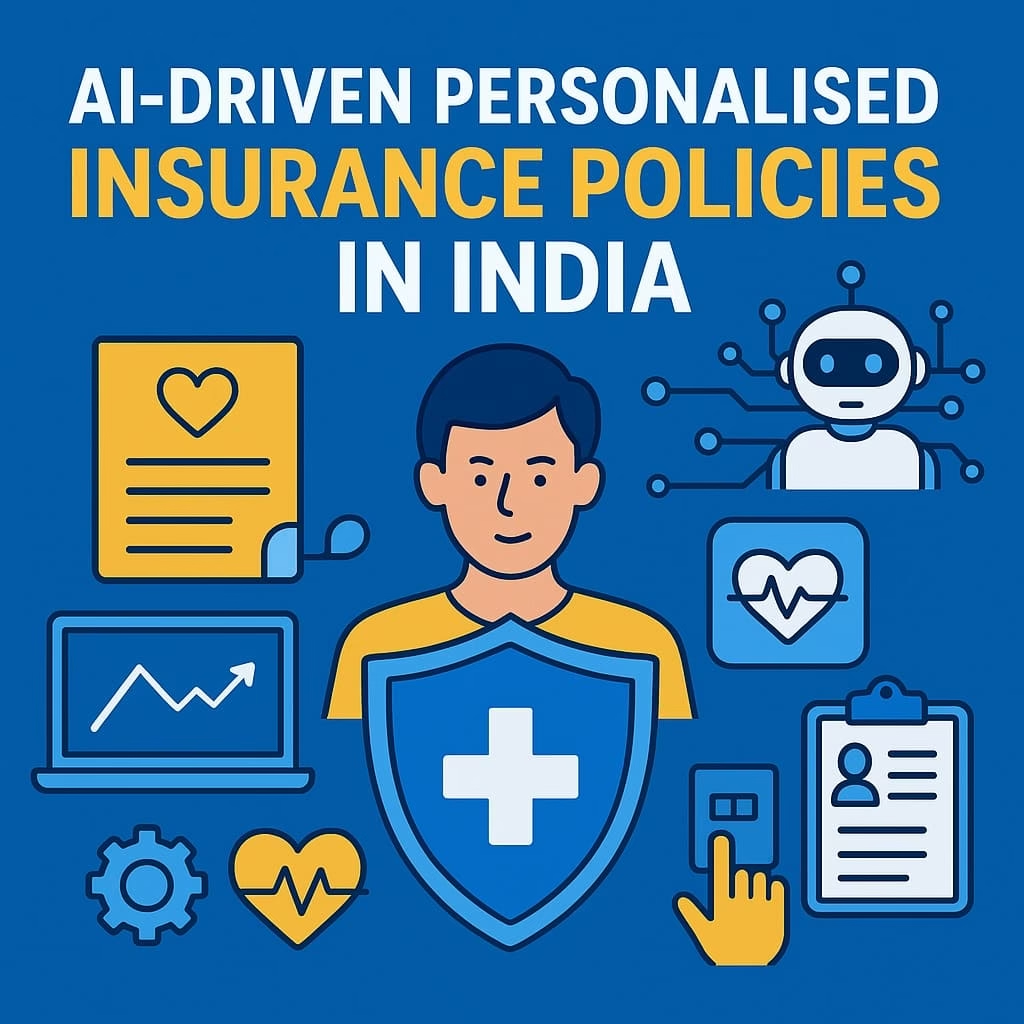Introduction
AI-Driven Personalized Insurance Policies in India are transforming the way people access and experience healthcare coverage. For decades, insurance followed a one-size-fits-all model, often leaving policyholders with limited flexibility and rising costs. Now, with artificial intelligence powering data-driven insights, insurers can design plans that reflect individual lifestyles, health records, and risk factors.
This shift is making insurance smarter and faster. It also helps millions of Indians enjoy fair premiums. Additionally, they gain from transparent coverage and wellness-focused options tailored to their needs.

1. What Are AI-Driven Personalized Insurance Policies in India?
Personalized insurance refers to policies designed specifically for an individual’s health profile, lifestyle choices, and risk level. Instead of offering generic plans, insurers now tailor coverage and premiums based on real-time data.
For example:
- A non-smoker with regular fitness activity will pay lower premiums.
- A young professional with minimal health risks can opt for lighter coverage at a reduced price.
- A senior citizen managing diabetes can get a policy with custom add-ons for long-term care.
👉 Related Read: Introduction to AI in Health Insurance in India
2. The Role of AI in Personalization

AI is the backbone of this new era of insurance. By analyzing massive datasets, AI enables insurers to predict risks, calculate fair premiums, and design customer-centric policies.
Key applications include:
- Wearable Data Integration
Smartwatches and health apps collect data like steps taken, heart rate, and sleep cycles. AI uses this to assess lifestyle habits and adjust premiums accordingly. - Predictive Analytics
AI models analyze past medical history, family health patterns, and lifestyle behaviors. They forecast future risks and set customized premiums. - Behavioral Insights
AI can identify habits such as smoking, sedentary lifestyles, or stress patterns, and recommend policies with tailored riders. - Dynamic Policy Adjustments
Unlike static policies, AI-driven insurance can evolve. Premiums and coverage change yearly—or even monthly—based on updated data.
3. Types of AI-Driven Personalized Insurance Policies in India
India’s insurance industry is actively exploring personalized policy models.
1. Health & Wellness-Based Policies
- Premiums linked to activity levels, diet, and preventive care habits.
2. Age-Specific Plans
- Young adults → accident coverage + mental health riders.
- Seniors → chronic illness benefits + hospitalization cover.
3. Occupation-Based Coverage
- A pilot in high-risk work gets higher-risk coverage.
- A corporate employee enjoys lower premiums.
4. Family-Centered Personalization
- Policies adapt to each member’s needs.
- Example: maternity benefits for young couples & critical illness cover for elders.
👉 Related: Usage-Based Car Insurance in India 2025: Save Big with Telematics
4. Benefits for Indian Customers
AI-driven personalization reshapes the insurance experience with benefits for both policyholders and insurers.
For Policyholders:
- ✅ Lower Premiums: Healthy behavior reduces costs.
- ✅ Custom Coverage: Plans match real needs, not generic assumptions.
- ✅ Transparency: Customers see how lifestyle impacts pricing.
- ✅ Rewards: Cashback, discounts, and loyalty points for fitness achievements.
For Insurers:
- Enhanced customer trust & loyalty.
- Reduced fraud through behavior-linked claims.
- Faster, more efficient policy design & underwriting.
5. Challenges of AI-Driven Personalized Insurance Policies in India
Despite its promise, AI-powered insurance faces key hurdles:
- Privacy Concerns – Wearable data raises questions about storage & misuse.
- Digital Divide – Many rural/semi-urban areas lack access to AI-based tools.
- Bias in AI Models – Incomplete datasets may unfairly judge risks.
- Regulatory Oversight – IRDAI is still developing frameworks for responsible AI adoption.
👉 External Reference: IRDAI – Insurance Regulatory and Development Authority of India
6. Real-World Examples in India
Several insurers in India already use AI-driven personalization:
- Aditya Birla Health Insurance – “Activ Health” with fitness-linked rewards.
- ICICI Lombard – AI wellness apps for risk assessment & benefits.
- HDFC ERGO – AI-powered underwriting for dynamic premiums.
👉 Learn More: NITI Aayog – National Strategy for Artificial Intelligence
7. The Future of AI-Driven Personalized Insurance Policies in India

Looking ahead, insurance in India will be smarter and more customer-first.
🌐 Trends to Watch:
- Ayushman Bharat Digital Mission (ABDM) linking health records with AI-insurance.
- Micro-insurance for rural India tailored to lifestyle & occupations.
- Gamification of health where customers earn rewards for wellness challenges.
- Blockchain + AI integration for secure, tamper-proof insurance data.
👉 External Source: Ayushman Bharat Digital Mission (ABDM)
FAQs on AI-Driven Personalized Insurance Policies in India
Q1: How is personalized insurance different from regular insurance?
➡️ Regular insurance applies the same premium for all. Personalized insurance tailors coverage + premium based on health data.
Q2: Do I need a fitness tracker for AI-personalized policies?
➡️ Not always. Wearables help, but insurers also use medical and digital health records.
Q3: Can premiums increase if I adopt unhealthy habits?
➡️ Yes, AI tracks lifestyle changes. Unhealthy habits may raise premiums.
Q4: Is personal data safe with insurers?
➡️ Top insurers comply with IRDAI & India’s Data Protection Act (2023). Always check privacy policies.
Q5: Can families buy personalized policies?
➡️ Yes, insurers offer family plans with separate personalization for each member.
Q6: Will AI replace human insurance agents?
➡️ No. AI assists agents but human advisors remain essential for complex decisions.
Conclusion
AI-Driven Personalized Insurance Policies in India are reshaping healthcare coverage by making it fairer, smarter, and customer-focused.
With customized premiums, wellness-linked rewards, and evolving coverage, personalization is quickly becoming the future standard.
As AI matures and regulatory frameworks strengthen, Indian customers can expect insurance that provides protection. It will also promote healthier living.
👉 Explore More: Introduction to AI in Health Insurance in India
Last Updated on August 25, 2025 by Singh Sumit

2 thoughts on “AI-Driven Personalized Insurance Policies in India: A Complete Guide”